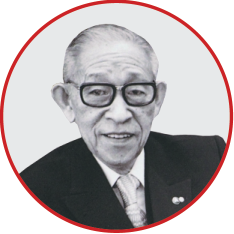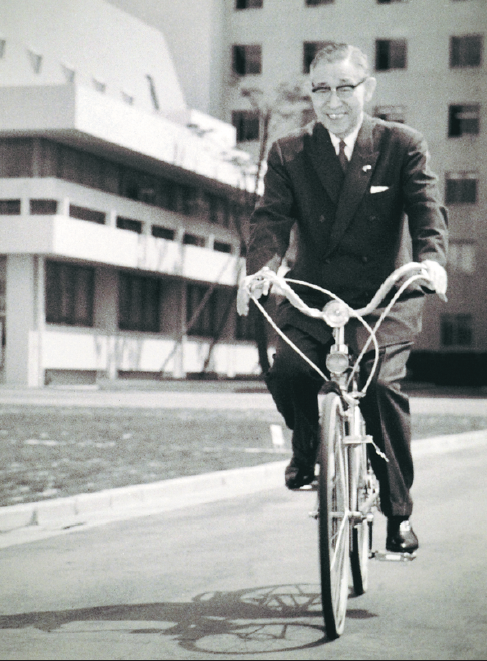
He was born in 1894, the youngest child in a family of 10.
Matsushita was sent to Osaka to be an apprentice in a charcoal brazier shop at the age of 9. With harsh experience in his early days, Matsushita always looked at difficult times with great optimism to learn, improve and strengthen himself. He started his own company, Matsushita Electric, at the age of 22.
He excelled as an innovator and a leader, turning his company into an electronics giant. Matsushita Electric's success led to visits from foreign VIPs such as United States attorney general Robert Kennedy and Indian prime minister Indira Gandhi, and the media also embraced Matsushita. He was featured in Life magazine in September 1954, and appeared on the cover of Time magazine in February 1963, bringing Matsushita Electric to worldwide prominence.
He retired as company chairman in 1973. Five years later, he spent 7 billion yen (equal to about $32 million at the time) of his own money to build the Matsushita Institute of Government and Management in the hope of training future leaders. Its graduates include people working in a wide range of fields, from politics to business, media, research and education.
Matsushita died in 1989 at age 94.
The tour that helped change a nation

At a meeting attended by Chinese electronics industry officials, then vice-premier Zhu Rongji said that under Matsushita's leadership, Matsushita Electric had started developing businesses in China in a friendly way.
"With a management policy appropriate to the conditions in China, they have set up many companies and invested substantial resources," Zhu said.
The establishment of CMC was an experimental project for the Chinese government. In April 1995, the now-defunct Ministry of Foreign Trade and Economic Cooperation issued guidelines for establishing holding companies that encouraged investment by large multinational companies.
CMC, later renamed Panasonic Corp of China, has become a regional headquarters for the multinational company. Two years ago, it joined the Chinese Entrepreneur Development Federation, becoming the only Japanese company in the organization.
"Panasonic has developed cooperation with five companies in the organization in the hope of growing with their partners," said Yokoh, who is chairman of Panasonic Corp of China.
Tanii said: "While working hard on producing home appliances, Panasonic has taken the initiative to face daunting challenges. As tough as it is, such a strategy is very important for a company."
In June, to showcase the philosophy of its founder-who is known in Japan as "the god of management"-and the company's wideranging operations, Panasonic turned its first factory in China, the picture tube plant in Beijing, into a museum.
In Matsushita's first meeting with Deng, he is reported to have said "the 21st century will be the era of Asia, including Japan and China". China is now the world's second-largest economy and Japan its third-largest.
Prescience was obviously one of his strong suits, along with a laconic sense of humor.
In 1979, when he visited Beijing Television Manufacturing, Panasonic's partner, Matsushita is reported to have said: "You're putting a great deal of effort into developing color TV. If you go on like this you're bound to overtake Japan technologically and develop things we don't even have.
"When that happens, please make Matsushita Electric the first company you sell your technology to."


